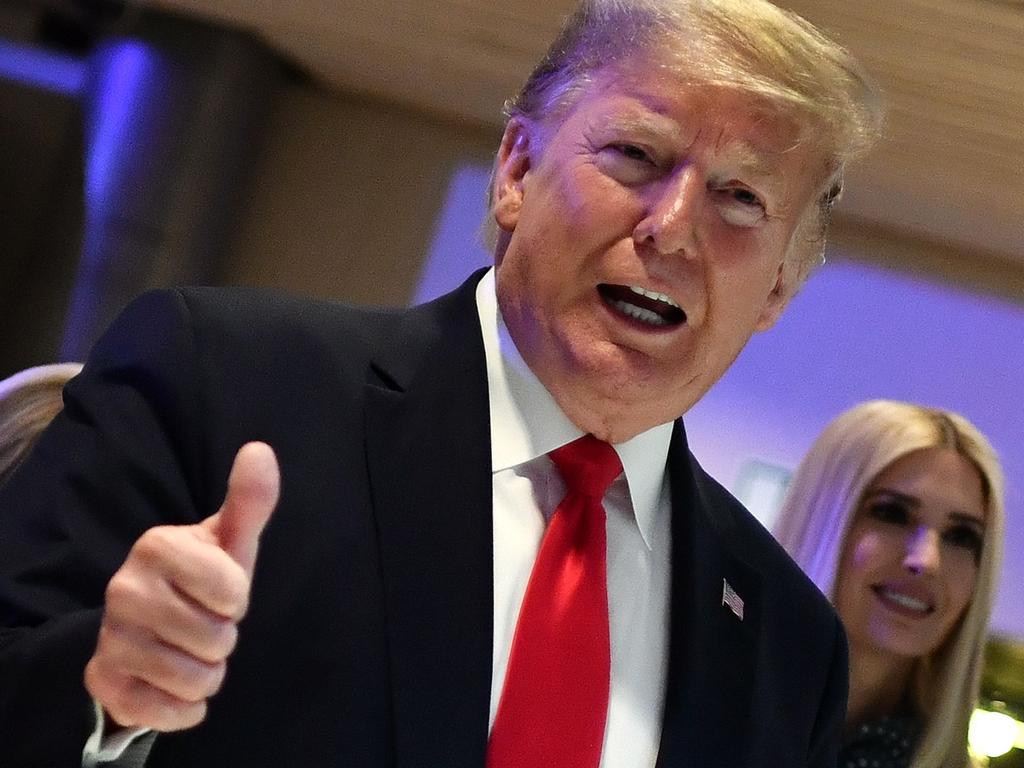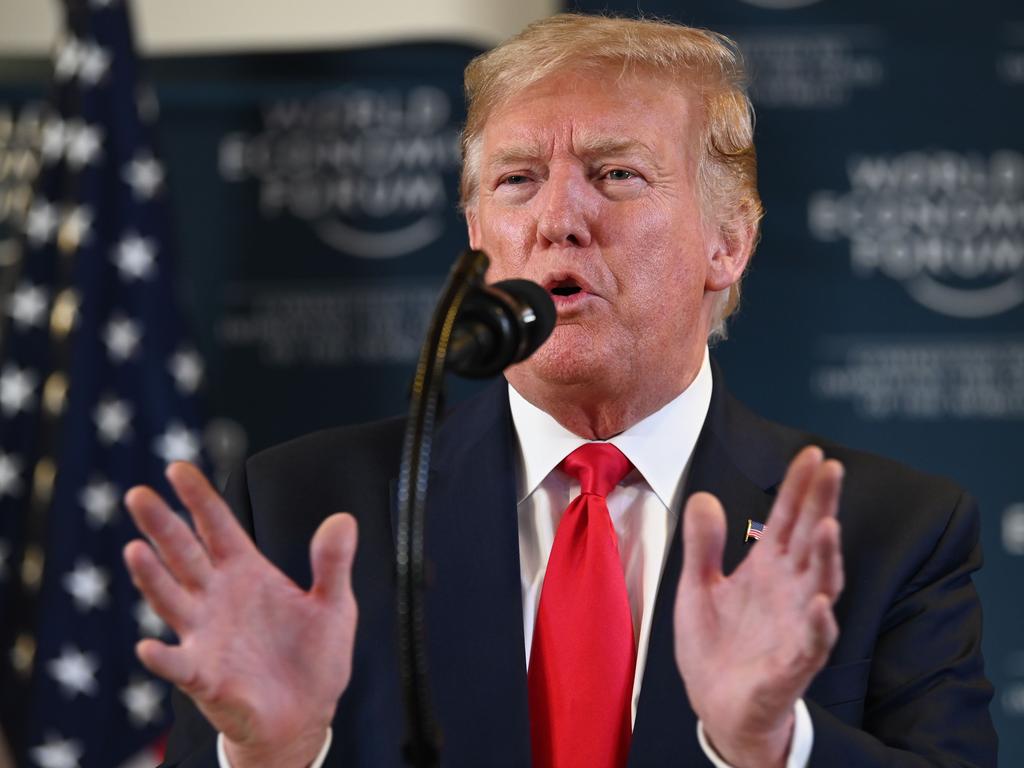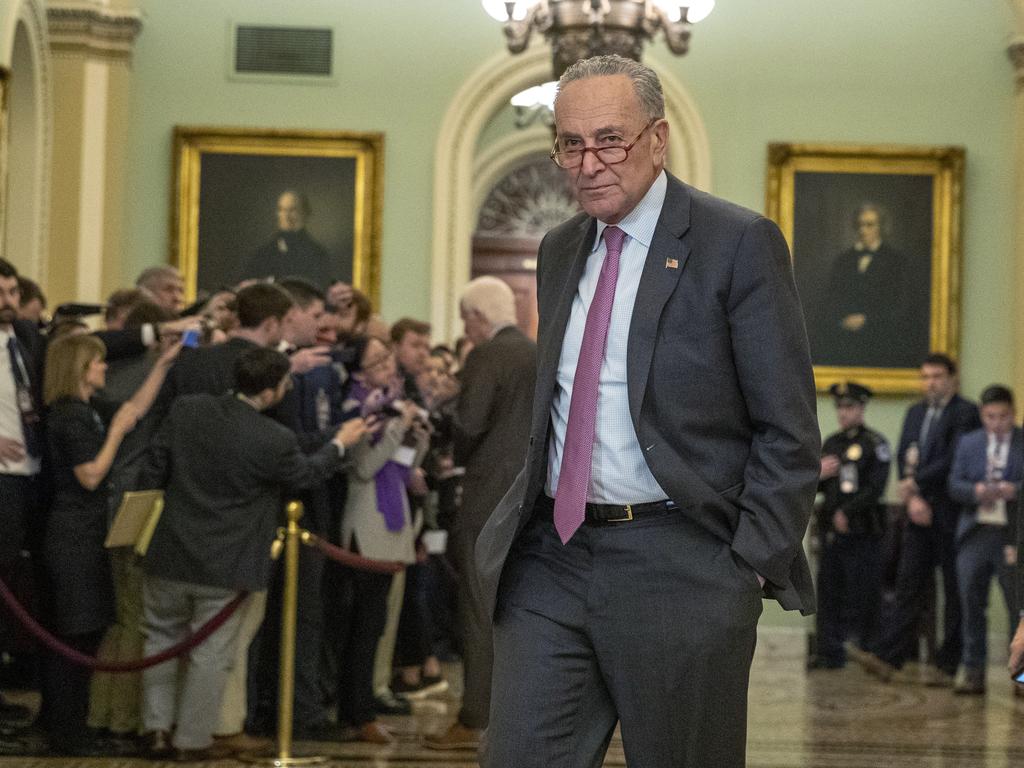In Donald Trump’s Senate trial, Mitch McConnell’s House rules
The Trump Senate trial has begun but the ultimate verdict will be delivered by the US voters.

As exhausted US senators filed from the chamber on Capitol Hill after a gruelling 12-hour day to start Donald Trump’s impeachment trial, Mitch McConnell smiled at a TV camera and said simply it had been a “good day”.
It had been more than that. The wily and ruthless Republican Senate majority leader had won a critical tactical game over the rules of the US President’s historic impeachment trial in Washington.
After hours of acrimonious debate, McConnell, 77, succeeded in rejecting everything the Democrats called for and set up the trial process Trump wanted.
McConnell’s trial rules are designed to deliver the fastest-ever acquittal of a president.
“Here in the Senate, the President’s lawyers will finally receive a level playing field with the house Democrats, and will finally be able to present the President’s case. Finally, some fairness,” McConnell said of his rules for the trial, which mirror those that governed Democrat president Bill Clinton’s impeachment trial in 1999.
Senator minority leader Chuck Schumer countered that the rules would not guarantee a fair trial or the “impartial justice” senators were sworn to provide.
“This will go down, this resolution, as one of the darker moments in the Senate history, perhaps even one of the darkest,” Schumer said.

The Democrat impeachment managers are now delivering their case against the President over three days, but they do so with no guarantee they will be able to call witnesses or compel new documents later in the trial. Democrats are finding that McConnell’s Republican-controlled Senate is a far cry from the Democrat-dominated house, which allowed them to call the shots throughout the house impeachment inquiry.
Even the most basic rules of the McConnell trial appear designed to wear down senators and encourage them to back a speedy adjudication of Trump’s alleged abuse of power and obstruction of congress.
Wearing down senators
The rules prevent senators in the chamber from speaking to each other or even passing notes on “punishment of imprisonment”.
Mobile phones and laptops are banned, crosswords are out and even coffee is not allowed.
“It’s miserable,” says Republican senator Jim Inhofe, who sat through the Clinton impeachment trial. “Doesn’t bother me a bit … if I can stay awake!”
Senators don’t live in a vacuum — they have all watched the house impeachment proceedings so they already know the arguments being presented for and against Trump.
Within hours of the start of proceedings, senators were playing with pens or staring idly into space. Journalists in the press gallery were reporting on senators who nodded off.

By 10pm on Tuesday (2pm Wednesday, AEDT), even ordinary citizens had given up. Only 29 people remained in the Senate public gallery.
McConnell knows the only outside chance the Democrats have of upsetting what appears to be a preordained acquittal of the President along party lines is to prevent new witnesses and evidence being admitted.
A vote on whether to call new witnesses will be taken after the Democrats and the President’s lawyers have each presented three days of opening arguments and after senators have been given 16 hours to ask questions.
For Republicans and Democrats, everything hinges on this witness vote — likely to be held late next week. The Democrats need four moderate Republicans to vote with them in the 53-47 seat Republican-controlled Senate.
Three moderate Republicans — Susan Collins, Lisa Murkowski and Mitt Romney — have signalled they are open to new witnesses, although they have not committed to voting for them.
So when Collins and Murkowski expressed concern about two aspects of McConnell’s proposed rules for the trial, the Senate leader quickly backtracked.
McConnell agreed to a compromise to allow three days instead of two for oral arguments and for the admission of evidence without a vote from the house impeachment inquiry.
Republican unity
This concession was welcomed by the Republican moderates and McConnell’s reward was that they sided with the party to reject 10 attempted amendments by Democrats to immediately allow new witnesses and documents.
Democrats attempted to pass amendments that would allow for the subpoena of documents from the White House, the Office of Management and Budget, Defence and State Department. They also sought subpoenas for Acting White House Chief of Staff Mick Mulvaney, former national security adviser John Bolton, White House aide Robert Blair and Michael Duffrey from the OMB.

Each motion was defeated along party lines, 53-47.
For McConnell, it was an encouraging sign of party unity at the outset of the trial. Democrats are furious he refused to agree to automatically approve new witnesses as part of the trial.
“If the Senate votes to deprive itself of witnesses and documents, the opening statements will be the end of the trial,” the lead Democrat impeachment manager, Adam Schiff, said.
On the first day of the trial, as the clock ticked past midnight, tempers flared over the issue as Democrat Jerry Nadler said attempts to block subpoenas for Bolton would be a “treacherous vote” and a “cover-up” for Republicans.
“Only guilty people try to hide evidence,” Nadler said.
That prompted a fierce response from White House counsel Pat Cipollone. “Mr Nadler came up here and made false allegations against our team … He’s been making false allegations against the President,” Cipollone said.
“The only one who should be embarrassed, Mr Nadler, is you, for the way you’ve addressed the United States Senate.”
The exchange led to Chief Justice John Roberts criticising the behaviour of both sides.
“It is appropriate at this point for me to admonish both the house managers and the President’s counsel in equal terms to remember that they are addressing the world’s greatest deliberative body,” Roberts said.
“One reason it has earned that title is because its members avoid speaking in a manner, and using language, that is not conducive to civil discourse.”
Good luck with that. Already these impeachment proceedings, only the third in US history, have been the most partisan and rancorous. There is no sign of compromise ahead.
Democrats are using history to bolster their arguments for new witnesses, pointing out the two presidential impeachment trials — Clinton’s and Andrew Johnson’s in 1868 — had witnesses.
They say if Trump has nothing to hide, as he claims, then Republicans and the White House have nothing to fear from new witnesses and new evidence. Any attempt to block them, says Schumer, would amount to “a cover-up” and any senator who opposes witnesses “will be voting to hide information and evidence from the American people”.
Republicans say it was the job of the house, not the Senate, to collect evidence on impeachment and the Senate’s role is merely to judge that evidence rather than re-try the case with new witnesses.
The President’s lawyers have told the trial the Democrats’ call for new witnesses and documents only shows they rushed the house impeachment proceedings without producing a conclusive case against Trump. Trump lawyer Patrick Philbin described the Democrats’ requests as a “stunning admission” that house prosecutors were now asking the Senate “to do their job for them”.
Even if Democrats succeed in a vote for witnesses during the trial, McConnell has warned that legal issues over executive privilege regarding their conversations with the President might cause an “indefinite delay” in the trial.
The President’s lawyers have attacked the impeachment proceedings from several angles. They have not contested the basic facts of the case against the President, which alleges that he sought to pressure the Ukraine government to investigate a political rival, former vice-president and 2020 election contender Joe Biden.
Instead, they argue in a submitted trial brief that the President has a right to conduct relations with other countries as he sees fit and that the charges “do not remotely approach the constitutional threshold” for removing a president from office. “The diluted standard asserted here would permanently weaken the presidency and forever alter the balance among the branches of government in a manner that offends the constitutional design established by the founders,” they say.
Cipollone told the Senate: “A partisan impeachment is like stealing an election. And that’s exactly what we have. Talk about the framers’ worst nightmare — it’s a partisan impeachment that they delivered to your doorstep in an election year.”
Trump’s lawyers also assert that the second article of his impeachment — obstruction of congress for blocking witnesses and documents — was “frivolous and dangerous” because it would invalidate a president’s right to confidential deliberations in violation of the separation of powers. Democrats say these arguments are a wilful misinterpretation of the aims of the US constitution’s founders because they wrongly assert that “the American people are powerless to remove a president for corruptly using his office to cheat in the next election”.
“President Trump did not engage in this corrupt conduct to uphold the presidency or protect the right to vote,” Democrat impeachment managers said. “He did it to cheat in the next election and bury the evidence when he got caught.”

Founding Fathers’ aim
The paucity of guidelines in the US constitution about impeachment allows for partisan interpretations of what the founders meant by the “high crimes and misdemeanours” that would justify a president’s impeachment and removal from office.
The saga has had pundits from both sides of politics making predictably partisan guesses as to what founders such as Alexander Hamilton would have thought about the move to convict Trump over his dealings with Ukraine.
The constitution also gives no advice about how impeachment trials should be conducted beyond saying the house has the power to impeach and the Senate the power to convict with a two-thirds majority. Johnson’s 1868 trial went for more than two months; Clinton’s went for five weeks. If senators vote for no new witnesses, the trial could be over and the President acquitted within two weeks, possibly before Trump delivers his State of the Union address on February 4.
The most important verdict will be delivered after the impeachment trial — that of voters.
Will they agree with Democrats that the impeachment saga was a worthwhile gamble to highlight the wrongdoings of a wayward President? Or will they agree with Republicans that impeachment was a partisan sham designed to try to overturn the 2016 election result?
With November’s election less than 10 months away, it is these voters, not the senators, who are the real jurors on impeachment.
Cameron Stewart is also US contributor for Sky News Australia








To join the conversation, please log in. Don't have an account? Register
Join the conversation, you are commenting as Logout